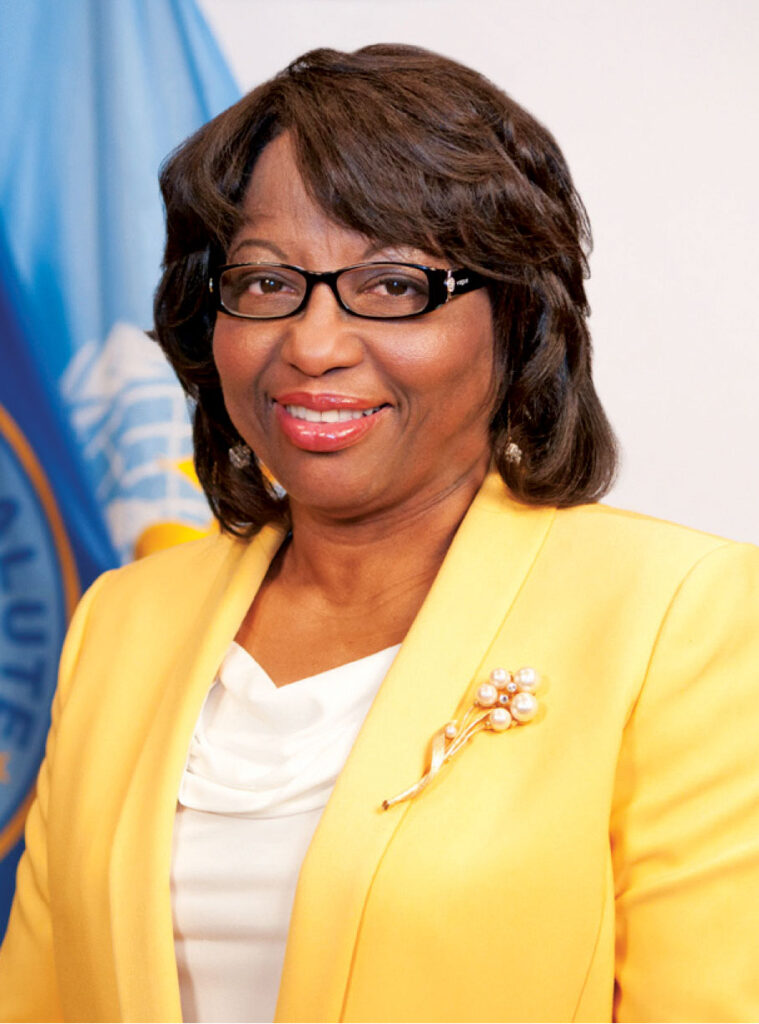Warning that COVID-19 vaccine deliveries to the Americas have slowed, Pan American Health Organization Director Carissa F. Etienne urged countries to employ a “comprehensive strategy” of not only immunization but also public health measures to curb the surging pandemic.

“I cannot stress this enough – for most countries, vaccines are not going to stop this wave of the pandemic,” Dr. Etienne said during her weekly media briefing. “There are simply not enough of them available to protect everyone in the countries at greatest risk.”
“Therefore, we need to stop transmission by any means possible with the tools we have at hand. This will require comprehensive strategies to both accelerate the rollout of vaccines and control the virus using proven public health measures,” she added, referring to wearing masks, social distancing, and hand hygiene.
Since March, PAHO’s Revolving Fund has helped deliver more than 3 million doses of COVAX-procured vaccines to 28 countries. The Revolving Fund negotiates, purchases, and arranges logistics for shipment of vaccines to the 36 countries that participate in COVAX. So far in the Americas, more than 247 million COVID-19 vaccines have been administered, including through deals countries made individually with vaccine producers.
But in the past few weeks, Dr. Etienne said, constraints on producers of COVAX vaccines have slowed deliveries, and supplies are not expected to normalize for a few more weeks. “In the meantime, we cannot rely on vaccines to control transmission,” she said.
“PAHO is committed to working with Member States to secure more vaccine doses for our region as soon as they are available to complement what countries have already purchased via bilateral deals and through the COVAX Facility,” she said. “We will be here for countries at every step of the way, providing technical support to troubleshoot roadblocks, increase surveillance and monitor the safety and impact of COVID vaccines.”
Dr. Etienne cautioned that the pandemic continues to surge across the Americas. In the past week, more than 1.3 million people were infected with the virus and nearly 36,000 people died from the disease. “Since the pandemic began, 57 million cases have been reported in the Americas, with more than 1.3 million deaths,” she said.
“We are not acting like a region in the midst of a worsening outbreak,” Dr. Etienne warned. “Despite ongoing transmission in many places, restrictions have relaxed. Crowds are back, and people are gathering indoors and taking public transportation, often without masks,” she continued. She said new, highly transmissible variants are also fueling acceleration.
Describing South America as the continuing “epicenter,” Dr. Etienne reported that new COVID-19 cases are sharply increasing in Brazil, Colombia, Venezuela, Peru, and some areas of Bolivia. Paraguay, Uruguay, Argentina, and Chile are experiencing continuing increases in infections. New variants in the Guyanas have driven a rise in cases in French Guiana and Guyana.
New infections are increasing in Cuba, Puerto Rico, and smaller Caribbean islands such as Curacao, Bermuda, and Aruba. Cases also continue to increase in Canada.
Dr. Etienne provided reassurance about the safety of the four vaccines authorized by WHO – the Pfizer/BioNTech vaccine, two versions of the Oxford-AstraZeneca vaccine, and the Janssen vaccine. All have proven to be safe and effective. Rare reports of blood clots are under review by regulatory agencies, which are expected to make recommendations soon, she said.
“In the meantime, it’s important to continue to administer AstraZeneca vaccines where they are available,” she said. “Almost 200 million people around the world have received AstraZeneca’s COVID-19 vaccine, and the reports of adverse effects are very rare. These vaccines can save your life and the lives of your friends and family.”
Dr. Etienne also addressed the eruption of the La Soufriere volcano in Saint Vincent and the Grenadines, reporting that PAHO has deployed five public health experts to respond to the emergency in coordination with the Ministry of Health. PAHO/WHO has also shipped 150,000 medical masks, other personal protective equipment, medical supplies, and test kits to the islands.










![.[L-R] Parliamentary Representative for Castries Southeast, Lisa Jawahir & Talk show host, Timothy Poleon](https://thevoiceslu.com/wp-content/uploads/2026/02/Lisa-Jawahir-Timothy-Poleon-380x250.jpg)
![Public Service and Utilities Minister Stephenson King delivered remarks [Photo credit: VP]](https://thevoiceslu.com/wp-content/uploads/2026/02/Stephenson-King-380x250.jpg)

